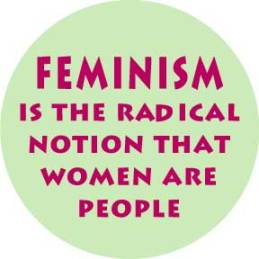It’s about freedom. Basically that’s what it’s all about. The right to your own life. The right to dream your own dreams. The right to decide over your own actions. The right to decide over your own body and what happens to it. That’s what we mean when we talk about human rights. And how ever we twist and turn this issue there’s no getting away from the fact that if you want to have the full right to decide over your own life you should avoid being born a woman. Regardless of where you look on this planet men have greater freedom that women. Of course there are lot of other things you should avoid if you want freedom; for instance being non-white, non-heterosexual, disabled or poor. But above all you should avoid being a woman. Of all the poor people in this world 70% are women. 99% of the worlds assets are owned by men. Women do 60% of the labour in this world but earn 10% of the money. There’s just no way to shrug those statistics off.
We can talk about injustice, unfair distribution, power abuse, corruption, we can all agree that our world isn’t fair. It’s true. And we do talk about it, but in those conversations we very rarely state that it’s actually also a gender issue. The world isn’t fair, but it’s even less fair if you’re a woman. No matter how bad the situation is in a country, be it war, famine or poverty, there’s one thing you can be sure of, and that’s that the situation for women and girls will be worse. Regardless of where we are in the world it’s always worse to be a woman. Why is that?
The oppression of women is never the highest item on the political agenda, it’s always one of the “minor issues”, one of those issues that aren’t as important. In all the debates on global poverty the blatant connection to gender is never mentioned, it becomes a sub-issue. Women are made into a “special interest” group whose interests can be pretty much be disregarded. Oppression of women becomes an issue that’s not really important. It’s not one of the big issues on the global political agenda. But 51% of the world’s population are women. How can something that concerns more than half of the world’s population be considered a “special interest”? And when looking at aid initiatives targeting poverty the results are unanimous: if you give the aid directly to women it will reach more people, children, old people, even men, the distribution will be wider and the success sustainable. It actually works. It’s been proven time and time again that if you really want increased living quality, disease and hunger reduction, financial stability and sustainable change for everyone, women should be the target for aid. And yet, this is not the rule, it’s the exception. Even though the evidence couldn’t be clearer, from an economic standpoint, anything else is even irrational, but it’s still not the rule. Why is that?
When we say “human”, what do we actually mean? What’s the norm for a human? What archetype are we referring to? Is it a woman in Rwanda? A girl in Bangladesh? Or even a lady in Brighton? No, when we speak of a human we are referring to a man. A white, heterosexual middle-class man in the western world. That’s a human. Strange isn’t it? How did we end up having a an absolute minority be the norm? And even if we extend it to include non-white people it still doesn’t include women. Women are an exception. We speak of freedom of speech, democracy and human rights. We criticize governments who hold political prisoners, we condemn acts of terrorism. It’s all on the public agenda. And at times, as a parenthesis, we can even go as far as to state that it’s important that women’s rights are taken into consideration. That they get access to education, that they have the right to vote. But in the subtext one burning fact stands out: Human rights and women’s rights are not synonymous. Human rights equal men’s rights. Read more of this post
feed the heads of others:









